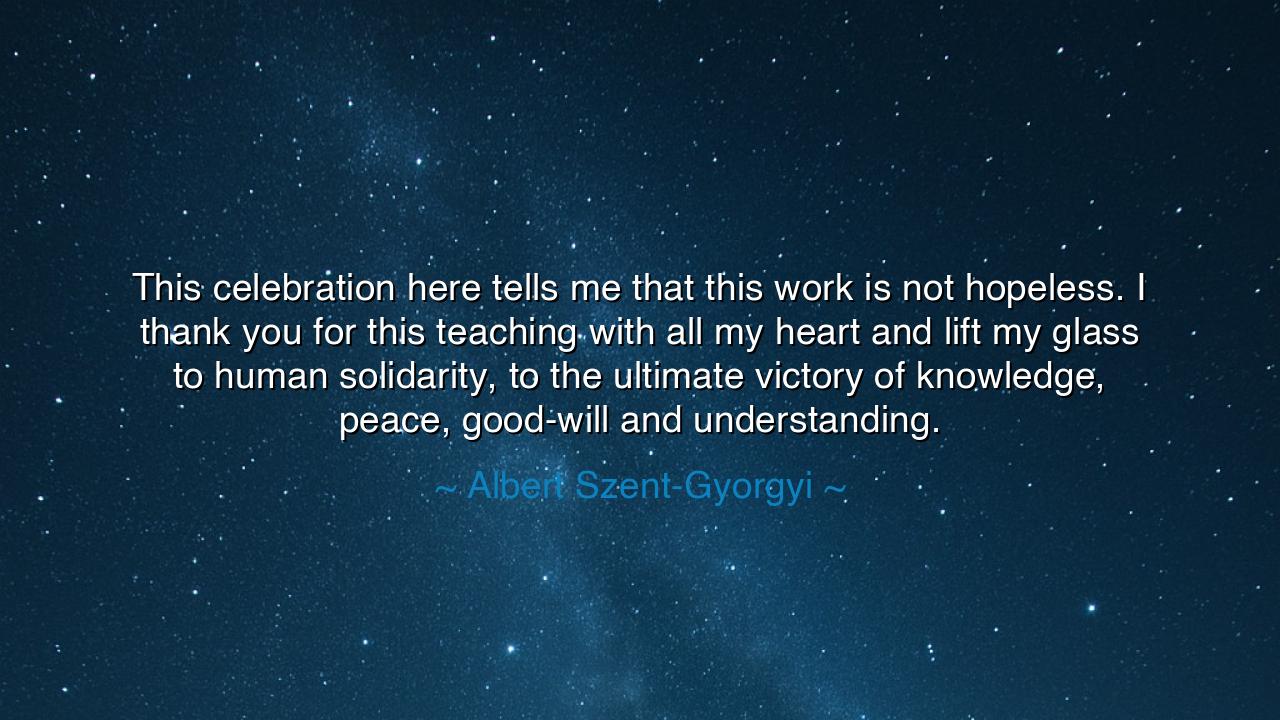
This celebration here tells me that this work is not hopeless. I
This celebration here tells me that this work is not hopeless. I thank you for this teaching with all my heart and lift my glass to human solidarity, to the ultimate victory of knowledge, peace, good-will and understanding.






In the words of Albert Szent-Györgyi: “This celebration here tells me that this work is not hopeless. I thank you for this teaching with all my heart and lift my glass to human solidarity, to the ultimate victory of knowledge, peace, good-will and understanding.” These words, spoken by a man who had seen both the triumph of discovery and the destruction of war, shine with the radiance of hope. They are a toast not to fleeting pleasures, but to the eternal virtues that can bind humanity together and lead it forward. For Szent-Györgyi, who discovered vitamin C and gave light to medicine, knew that true victory lies not in conquest, but in solidarity.
The ancients, too, raised their voices to these ideals. In Greece, the philosophers spoke of philia, the brotherly love that binds a city. In Rome, Cicero declared that peace and concord were the highest goods of the republic. And in the East, sages taught that harmony between peoples was the truest measure of civilization. What Szent-Györgyi expressed in his celebration is the same ancient truth: that humanity’s highest destiny is not to divide, but to unite, not to destroy, but to heal.
Consider the life of Szent-Györgyi himself. He lived through the storms of the twentieth century—wars, oppression, and the shadow of despair. Yet his work in science, his pursuit of knowledge, was never for himself alone. It was for the health of others, for the preservation of life. When he raised his glass to peace and good-will, it was not as a dreamer detached from reality, but as a man who had seen suffering and chose hope over despair. His words remind us that even in the darkest times, the flame of understanding can be kindled by human hands.
History provides us with echoes of this spirit. After the devastation of the Second World War, nations gathered to create the United Nations—not a perfect body, but an attempt at solidarity. They declared in their charter the pursuit of peace, the defense of human rights, and the advancement of knowledge to uplift all nations. This act was itself a celebration—a recognition that the work of building a better world is never hopeless, even after catastrophe.
The power of this quote lies also in its humility. Szent-Györgyi does not claim to have the final answers, but he gives thanks for the teaching of others. He sees himself as part of a greater chorus, where every voice, every discovery, every act of compassion contributes to the symphony of progress. His gratitude shows us that greatness is never solitary—it is woven from the countless strands of shared endeavor, made strong by mutual respect.
The lesson for us is clear: do not fall into despair, even when the world seems broken. Celebrate every act of kindness, every new discovery, every effort at reconciliation. These are not small things, but the bricks of the future. Work for knowledge, for in it lies light; work for peace, for in it lies survival; work for good-will and understanding, for in them lies joy. And above all, work for solidarity, for only together can humanity rise beyond its divisions.
Therefore, O listener, let this wisdom settle deep in your heart. Lift your own glass—not only in festivals or feasts, but in daily life—to the unseen victories of compassion and truth. Live in such a way that your work, your words, and your choices become part of this great celebration of humanity’s spirit. For as Szent-Györgyi declares, the work is not hopeless. The ultimate victory awaits those who believe, who labor, and who love.






AAdministratorAdministrator
Welcome, honored guests. Please leave a comment, we will respond soon